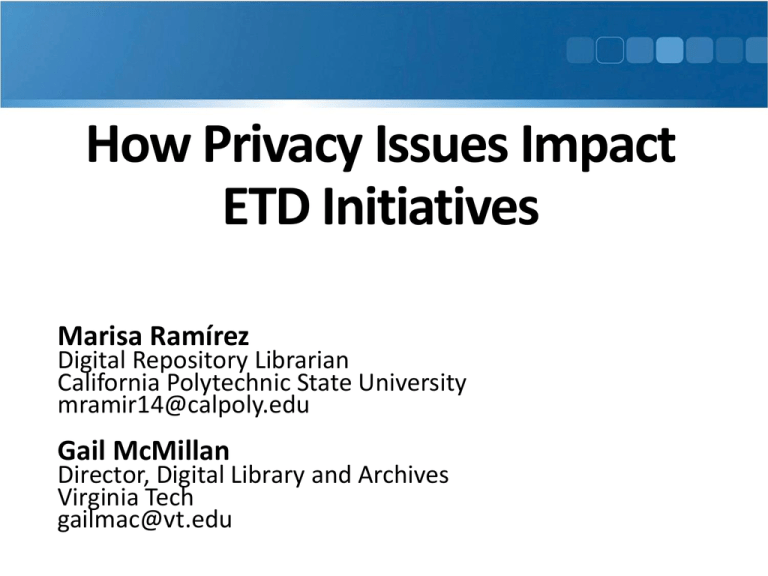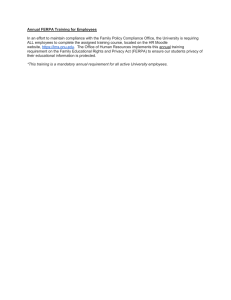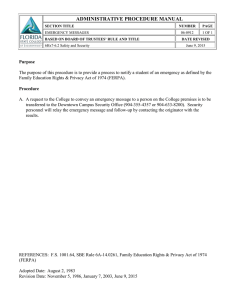How Privacy Issues Impact ETD Initiatives Marisa Ramírez Gail McMillan
advertisement

How Privacy Issues Impact ETD Initiatives Marisa Ramírez Digital Repository Librarian California Polytechnic State University mramir14@calpoly.edu Gail McMillan Director, Digital Library and Archives Virginia Tech gailmac@vt.edu About FERPA The Cal Poly Experience The Virginia Tech Experience Other experiences Family Educational Rights and Privacy Act (FERPA) of 1974 a.k.a. Buckley Act Designed to protect the privacy of student educational records Challenges to FERPA resulted in refinements to the Act Applicable to all public K-12 educational institutions & postsecondary institutions that receive US Department of Education funds FERPA grants rights to students Inspect and request corrections to their education records Limit the release of “personally identifiable” information from their records Education records are “directly related to a student and maintained by an educational agency or institution” Includes “any information recorded in any way, including, but not limited to, handwriting, print, computer media, video or audio tape, film, microfilm, and microfiche.” When may a school disclose education records without student consent? School officials with “legitimate educational interests” Student is seeking to enroll in another school Educational authorities enforcing Federal or State supported education laws /programs Parents of a dependent for income tax purposes Eligibility and terms for financial aid Subpoena Directory information Definition: "information that would not generally be considered harmful or an invasion of privacy if disclosed” Student's name, address, phone number, email Photograph, date and place of birth Major, grade level, enrollment status, dates of attendance, participation in university activities Weight and height of student athletes Degrees, honors and awards received; most recent educational institution attended Students must be provided an opportunity to “opt out” of the release of directory information Are the release and circulation of student works limited under FERPA? According to LeRoy S. Rooker, Director of the Department of Education's Family Policy Compliance Office Theses are different -- research sources for the academic community available through the library No written consent needed to make a thesis available through the library AS LONG as the student has been advised in advance that it will be publicly available as part of the curriculum requirements --"Department of Education Clarifies Access to Theses." ALA Washington Office Newsline, 8 Sept 1993. Cal Poly Member, California State University system 19,000+ students, 1,100 graduate students Centralized model for paper deposit ETD pilot (Spring 2008) Understanding the library need, ability, and responsibility to enforce FERPA Subsequent self-review to adjust library activities subject to FERPA laws, such as circulation records, interlibrary loan requests, and student employment records In consultation with the campus FERPA Compliance Officer additional wording to student click-thru license: "Students making submissions to this repository agree to share their work and waive any privacy rights granted by FERPA or any other law, policy or regulation, with respect to this work, for the purpose of publication.” Virginia Tech Land grant university, founded 1872 30,000 students: 5,000 grad students Centralized model: 145 programs ETDs required Jan. 1, 1997 Focused on access and copyright No forethought given to FERPA Minimal privacy concerns Addressing FERPA requirements retroactively (not uncommon) Attention of University Legal Counsel Reviewing policies for records management Embargoed ETDs misunderstood Explicit permission given for unlimited access I hereby grant to [the institution and its agents] the non-exclusive license to archive and make accessible…my thesis, dissertation… Implicit permission to override FERPA opt-out Nullifies previous requests for privacy Has your university dealt with issues of students' rights to nondisclosure? What has your university done about ETDs in regards to FERPA requirements? Do you have experience with students invoking their FERPA rights so that all information about their ETDs must be withheld indefinitely? To the extent this thesis, dissertation, or record of study is an educational record as defined in FERPA, I consent to disclosure of it to anyone who requests a copy. [TAMU, Baylor, etc.] By signing [the ETD Release Form], the student is specifically granting a non-exclusive distribution license to the University of Kansas, authorizing disclosure of the student’s work to others, and is relinquishing and waiving any claims that may arise under any statutory or common law protections as a result of the use of this work for these purposes. I grant the University [of Oregon] Libraries permission to make my research freely and publicly available in the digital archive known as Scholars' Bank. [BTDs 2007- ] University-wide FERPA guidelines common "We do not change our policies simply because our educational delivery methods have changed." Richard Rainsberger, Oct. 2001 “Based on a policy letter [reported in ALA Washington Office Newsline, Sept. 8, 1993] from Leroy Rooker, former FERPA director, we are not changing anything.” VT University Counsel, June 2009 Laws, generally, Do not ensure rights to privacy Focus more on public, not private, good Access to information, not protection Student privacy rights: US-centric issues Intellectual property gets more attention than privacy rights. Increased access to personal information When delivery methods change, it is an opportunity to evaluate policies. Whether privacy is legislated, be aware of the myriad of related issues. ETDs: Explicit permission BTDs: Implicit permission Contact: Marisa Ramírez Digital Repository Librarian California Polytechnic State University mramir14@calpoly.edu Gail McMillan Director, Digital Library and Archives Virginia Tech gailmac@vt.edu


![[Date] [Insert name/address of person doing observation] [Student’s name]](http://s2.studylib.net/store/data/015502417_1-ba344f07c5e1458cb15ba4718659ad4b-300x300.png)